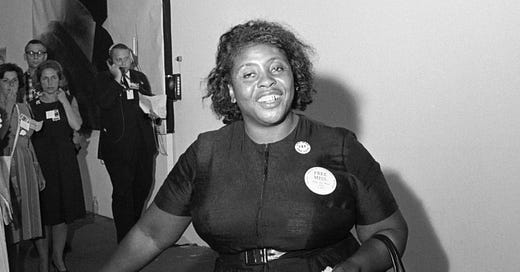For Black Americans, hope is a cultural expression and an identity marker. It’s almost cliché, really. You can’t even consider hope in the American sense without visualizing vast groups of us marching, maybe even singing “We Shall Overcome”. But, after all that has happened and continues to happen to us, it is often asked how we could be so hopeful? This question completely misunderstands the concept of hope and part of that misunderstanding is owed to the erasure of our history.
This country tells itself a Black history in which we patiently waited toiling and hoping until holy Mr. Lincoln freed us. Then, after another century of hoping, the beneficent LBJ gifted us the right to vote and we’ve been voting not quite hard enough ever since.
When it is associated with a people storied to be victimized without agency, it’s easy to see why hope might be defined as a self-soothing method of waiting for rescue.
The truth is that enslaved Black people were freeing themselves in one way or another as soon as they were forced onto the ships in Africa—and they continued freeing themselves every single day until the end of the Civil War. During Reconstruction, when Black men had the right to vote, we were of course electing ourselves to public office, but participating in a political system designed in part to keep us enslaved was never the goal. Robert Smalls, for example, wasn’t satisfied with being in public office and so he also led efforts in building Black schools and Black railroads and Black-run towns.
During the Civil Rights Era, Fannie Lou Hamer was known for her part in the passing of the Voting Rights Act of 1965. But, since changing oppressive power structures is rarely on the ballot, she went on to form the Freedom Farm Cooperative, giving Black Mississippi farmers economic agency and creating housing for more than 70 families.
We learn about Dr. King’s “I Have a Dream” speech and his support of the Civil Rights Act. But we’ve forgotten that he came to national attention by organizing a public transportation boycott and was assassinated while supporting a sanitation workers’ strike.
After Roe v. Wade fell, the media began running stories about networks of Black women who had been helping women get abortions for decades. Now that Roe is gone, it’s viewed as a loss for women across the nation, but the truth is that for countless women in rural and impoverished areas, Roe had never been much more than a symbolic gesture.
For Black Americans, hope is not a passive belief that altruistic outside forces will someday rescue us. Our hope doesn’t come from the passing of laws and it has never been reliant on the outcome of an election. One political party tells us we’ll never be equal and the other says we will, but not just yet. So, for us, hope comes from our own necessary and proven ability to save ourselves.
It’s not about wishing, it’s about taking action. So, of course, whenever you can, donate, organize and get organized. But for now, go take that First Aid class. Enroll in a Naloxone training course. Learn how to build shelters. Before you know it, just your presence will make everyone around you a little safer. And hope will follow.
https://samuelj.substack.com/p/my-top-5-runaway-slave-ads
https://samuelj.substack.com/p/the-wheelman
https://www.rmg.co.uk/stories/blog/curatorial/dying-on-their-own-terms-suicides-aboard-slave-ships
https://kinginstitute.stanford.edu/memphis-sanitation-workers-strike
https://umaine.edu/outdoorleadership/survival/shelter-building/
https://cpr.heart.org/en/course-catalog-search
https://www.overdoselifeline.org/opioid-training-and-courses/layperson-naloxone-administration/





Great read. Amazing writer.